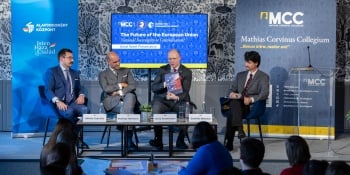Published: 10.02.2023

- Politicians of Ukrainian President Volodymyr Zelenskiy's party are demanding the legalization of surrogacy and ectogenesis, or "breeding" of humans in laboratory conditions, claiming that this is a condition for Ukraine's admission to the European Union.
- At the request of Ukrainian social organizations, the Ordo Iuris Institute has prepared an opinion pointing out the groundlessness of such a thesis.
- The Institute stresses that no provision of EU law imposes an obligation to legalize surrogacy or ectogenesis.
- Instead, EU laws indicate that surrogacy and ectogenesis are contrary to human rights.
A bill fully legalizing surrogacy and ectogenesis has been submitted to the Ukrainian parliament. According to some politicians of the Servant of the Nation (ukr. Слуга народу) party, a group of President Volodymyr Zelenskiy, this is necessary for Ukraine's accession to the European Union.
Surrogacy, also known as surrogacy, is a contract in which a woman agrees to become pregnant through in vitro fertilization, give birth to a child and transfer parental rights to the client. Ectogenesis is the breeding of an organism under artificial conditions. Although it is not currently technologically possible, the possibility of "growing" a human being under completely laboratory conditions is being considered in scientific circles. Currently, it is only possible to conceive a human being in the laboratory (in vitro fertilization), while the pregnancy itself must take place in the woman's uterus.
The Ordo Iuris Institute, at the request of Ukrainian social organizations, has prepared an analysis showing that European Union law does not require the legalization of surrogacy and ectogenesis. The EU's framework of competence is set by three legal acts (considered so-called primary law): The Treaty on the Functioning of the European Union, the Treaty on European Union and the EU Charter of Fundamental Rights. There is no provision in any of these acts that addresses the issue of surrogacy and ectogenesis at all, let alone the need to legalize them. Nor have the EU institutions adopted any directive or regulation requiring member states to legalize surrogacy and ectogenesis.
On the contrary, surrogacy is banned in most EU countries, and on top of that, it is considered by some EU institutions to be incompatible with the provisions of EU law. The Ordo Iuris Institute's analysis recalls that, for example, the European Parliament, in a 2015 resolution, condemned the practice of surrogacy, which undermines a woman's human dignity because her body and reproductive functions are used as a commodity. The EP also believes that this practice, which includes the reproductive use of the human body for profit or other gain, especially for vulnerable women in developing countries, should be banned and treated as an urgent issue under human rights instruments.
No EU institutions have commented on ectogenesis. Unlike surrogacy, the problem is still hypothetical, because according to the current state of science, completely artificial creation of a human being is not possible. However, an analysis by the Ordo Iuris Institute indicates that, regardless of this, the legality of ectogenesis raises questions of compatibility with Article 3(2)(d) of the EU Charter of Fundamental Rights (prohibition of reproductive cloning of human beings). While ectogenesis is not the same as cloning, it is an essential part of it.

07.05.2025
• The European Court of Human Rights has upheld a complaint by a same-sex couple whose Polish registry office refused to register a marriage contracted in the United Kingdom. This is the fourth judgment in which the ECHR indicates that Poland has an obligation to ensure that same-sex couples can formalize their cohabitation.

17.04.2025
• The Ordo Iuris Institute has prepared an opinion for the UN as part of a thematic report on surrogacy and its impact on the rights of women and children.

09.04.2025
• On April 8, the Ordo Iuris Institute presented the Polish version of a document with proposals for reforming the European Union, prepared jointly with Hungary’s Mathias Corvinus Collegium (MCC).
